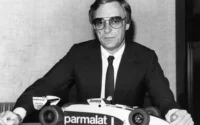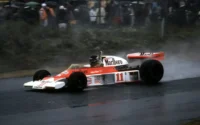James Hunt was a British Formula One driver who later became an F1 commentator alongside Murray Walker. He competed in Formula One from 1973 to 1979 and is best remembered for winning the 1976 Drivers’ Championship with McLaren. Hunt, often referred to as “The Shunt” due to his aggressive driving style, was known for both his on-track brilliance and his playboy lifestyle off it.
| Nationality | British |
|---|---|
| Born | James Simon Wallis Hunt 29 August 1947 Belmont, Surrey, England |
| Died | 15 June 1993 (aged 45) Wimbledon, London, England |
Hunt began his racing career in touring cars before moving up to Formula Three in 1969, where his daring driving caught the eye of Lord Hesketh, founder of Hesketh Racing. He joined Hesketh in 1973, making his Formula One debut in a March 731 chassis at the 1973 Monaco Grand Prix. Hunt quickly impressed by securing podium finishes in his rookie season at the Dutch and United States Grands Prix. In 1974, Hesketh introduced their own 308 chassis, which Hunt used to score multiple podiums and win the non-championship BRDC International Trophy. In 1975, he claimed his first Grand Prix victory at the 1975 Dutch Grand Prix, which remains one of the best underdog triumphs in F1 history.
Despite his success, Hesketh Racing couldn’t secure sponsorship for the following season, prompting Hunt to join McLaren in 1976, where he won a thrilling title battle with Niki Lauda; Hunt won the World Championship by a single point. The following year, he won more races but finished fifth overall due to mechanical issues. After a winless 1978 season, Hunt moved to Wolf Racing in 1979 but retired following the 1979 Monaco Grand Prix. His career totals included 10 race wins, 14 pole positions, eight fastest laps, and 23 podium finishes in Formula One.
In 1980, Hunt considered a comeback with McLaren at the 1980 United States Grand Prix West, asking for $1 million, but negotiations fell through after he broke his leg skiing. In 1982, he turned down a £2.6 million offer from Brabham. Facing financial difficulties in 1990, Hunt briefly entertained a return with Williams, even testing at the Paul Ricard Circuit, but he was off the pace. Despite seeking support from Philip Morris, the comeback ultimately did not materialise.
After retiring from racing, Hunt became a well-known commentator for the BBC and also mentored future two-time World Champion Mika Hakkinen through his association with Marlboro. Hunt passed away at the age of 45 from a heart attack at his home in Wimbledon.
James Hunt Formula One World Championship career
| F1 Career | 1973–1979 |
|---|---|
| Teams | Hesketh, McLaren, Wolf |
| Entries | 93 (92 starts) |
| Championships | 1 (1976) |
| Wins | 10 |
| Podiums | 23 |
| Career points | 179 |
| Pole positions | 14 |
| Fastest laps | 8 |
| First entry | 1973 Monaco Grand Prix |
| First win | 1975 Dutch Grand Prix |
| Last win | 1977 Japanese Grand Prix |
| Last entry | 1979 Monaco Grand Prix |
James Hunt Teammates
| 6 Teammates | Involvement | First Year | Last Year |
|---|---|---|---|
| Ian Scheckter | 1 | 1974 | |
| Brett Lunger | 3 | 1975 | |
| Jochen Mass | 33 | 1976 | 1977 |
| Gilles Villeneuve | 1 | 1977 | |
| Bruno Giacomelli | 6 | 1977 | 1978 |
| Patrick Tambay | 16 | 1978 |
Race Wins
| Win Number | Grand Prix |
|---|---|
| 1 | 1975 Dutch Grand Prix |
| 2 | 1976 Spanish Grand Prix |
| 3 | 1976 French Grand Prix |
| 4 | 1976 German Grand Prix |
| 5 | 1976 Dutch Grand Prix |
| 6 | 1976 Canadian Grand Prix |
| 7 | 1976 United States Grand Prix |
| 8 | 1977 British Grand Prix |
| 9 | 1977 United States Grand Prix |
| 10 | 1977 Japanese Grand Prix |
Complete Formula One Results
| Year | Entrant | Chassis | Engine | 1 | 2 | 3 | 4 | 5 | 6 | 7 | 8 | 9 | 10 | 11 | 12 | 13 | 14 | 15 | 16 | 17 | WDC | Points |
|---|---|---|---|---|---|---|---|---|---|---|---|---|---|---|---|---|---|---|---|---|---|---|
| 1973 | Hesketh Racing | March 731 | Ford Cosworth DFV 3.0 V8 | ARG | BRA | RSA | ESP | BEL | MON 9 | SWE | FRA 6 | GBR 4 | NED 3 | GER | AUT Ret | ITA DNS | CAN 7 | USA 2 | 8th | 14 | ||
| 1974 | Hesketh Racing | March 731 | Ford Cosworth DFV 3.0 V8 | ARG Ret | BRA 9 | 8th | 15 | |||||||||||||||
| Hesketh 308 | Ford Cosworth DFV 3.0 V8 | RSA Ret | ESP 10 | BEL Ret | MON Ret | SWE 3 | NED Ret | FRA Ret | GBR Ret | GER Ret | AUT 3 | ITA Ret | CAN 4 | USA 3 | ||||||||
| 1975 | Hesketh Racing | Hesketh 308B | Ford Cosworth DFV 3.0 V8 | ARG 2 | BRA 6 | RSA Ret | ESP Ret | MON Ret | BEL Ret | SWE Ret | NED 1 | FRA 2 | GBR 4 | GER Ret | AUT 2 | 4th | 33 | |||||
| Hesketh 308C | Ford Cosworth DFV 3.0 V8 | ITA 5 | USA 4 | |||||||||||||||||||
| 1976 | Marlboro Team McLaren | McLaren M23 | Ford Cosworth DFV 3.0 V8 | BRA Ret | RSA 2 | USW Ret | ESP 1* | BEL Ret | MON Ret | SWE 5 | FRA 1 | GBR DSQ | GER 1 | AUT 4 | NED 1 | ITA Ret | CAN 1 | USA 1 | JPN 3 | 1st | 69 | |
| 1977 | Marlboro Team McLaren | McLaren M23 | Ford Cosworth DFV 3.0 V8 | ARG Ret | BRA 2 | RSA 4 | USW 7 | MON Ret | 5th | 40 | ||||||||||||
| McLaren M26 | Ford Cosworth DFV 3.0 V8 | ESP Ret | BEL 7 | SWE 12 | FRA 3 | GBR 1 | GER Ret | AUT Ret | NED Ret | ITA Ret | USA 1 | CAN Ret | JPN 1 | |||||||||
| 1978 | Marlboro Team McLaren | McLaren M26 | Ford Cosworth DFV 3.0 V8 | ARG 4 | BRA Ret | RSA Ret | USW Ret | MON Ret | BEL Ret | ESP 6 | SWE 8 | FRA 3 | GBR Ret | GER DSQ | AUT Ret | NED 10 | ITA Ret | USA 7 | CAN Ret | 13th | 8 | |
| 1979 | Olympus Cameras Wolf Racing | Wolf WR7 | Ford Cosworth DFV 3.0 V8 | ARG Ret | BRA Ret | RSA 8 | ESP Ret | MON Ret | FRA | GBR | GER | AUT | NED | ITA | CAN | USA | NC | 0 | ||||
| Wolf WR8 | Ford Cosworth DFV 3.0 V8 | USW Ret | BEL Ret |
Sources:
- James Hunt. Wikipedia.com


